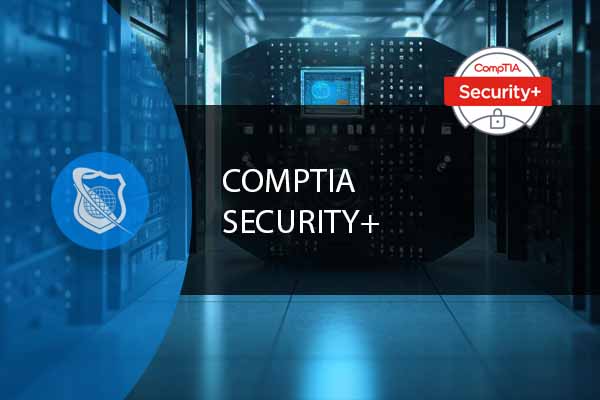PKI is more than just a technology; it’s a comprehensive system involving roles, policies, hardware, software, and services designed to secure communications and authenticate the identities of entities on the internet. In the digital age, the security of online transactions, sensitive communications, and identity verification is paramount. This is where Public Key Infrastructure (PKI) comes into play, serving as the backbone of internet security.
The Essence of PKI
At its core, PKI involves assigning a public key and its associated private key to an entity—be it an organization, device, or individual. This system facilitates the secure transfer of information across various platforms, such as e-commerce, internet banking, and confidential email communication. By leveraging PKI, entities can ensure the integrity, confidentiality, and authenticity of the information exchanged online.
Secure Your Networks and Prevent Password Breaches
Our robust CompTIA Sec+ course is the perfect resouce to ensure your company’s most valuable assets are safe. Up your security skills with this comprehensive course at an exceptional price.
Key Components of PKI
- Certificate Authority (CA): The CA is the cornerstone of the PKI system, responsible for issuing digital certificates that validate the identity of the certificate holder. This process can be automated or manual, depending on the level of assurance required.
- Registration Authority (RA): The RA acts as a verifier, ensuring that entities requesting certificates are legitimate and not fraudulent. This role is crucial for maintaining the trustworthiness of the PKI system.
- Validation Authority: This component validates the identity of entities holding certificates, providing an additional layer of security and trust for online transactions.
- Certificates: These are digital documents containing the public key of an entity, along with metadata for identification. Certificates are central to the PKI system, enabling secure communication between parties.
The PKI Process
The process begins with an entity applying for a digital certificate through the RA, which validates the entity’s legitimacy before instructing the CA to issue a certificate. Once the certificate is issued, it can be used to secure communications and transactions online. This streamlined process ensures that only verified entities can participate in secure online activities.
Hierarchical Structure of CAs
PKI employs a hierarchical model with the root CA at the top, signing its own certificate and then issuing certificates to subordinate CAs. These subordinates can further distribute certificates, creating a trusted chain from the root CA to the end-user. This structure allows for efficient management and distribution of certificates on a large scale.
Public vs. Enterprise CAs
The public is familiar with certificate authorities like Verisign, Digicert, and GoDaddy, which issue certificates for a wide range of purposes. However, organizations often establish their own internal PKI systems, known as enterprise CAs, to manage certificates for internal use. These internal certificates may not be recognized outside the organization but are crucial for securing internal communications and transactions.
Key Escrow: Safeguarding Private Keys
Key escrow is a security measure for storing private keys securely, typically used for critical keys like those of the root CA. By entrusting the private key to a third party or splitting it among multiple entities, organizations can protect against unauthorized access and compromise, ensuring the integrity of the PKI system.

Information Security Manager Career Path
Propel your career forward and be part of an essential member of any management team as an Information Security Manager. This advanced training series is designed specifically for those want to move up into a management position in the IT field.
Conclusion
PKI remains an essential element of digital security, providing the means to secure communications, authenticate identities, and ensure the integrity of online transactions. By understanding the components and processes of PKI, individuals and organizations can better protect their digital assets and foster a safer online environment.
Key Term Knowledge Base: Key Terms Related to Public Key Infrastructure (PKI)
Understanding the terminology related to Public Key Infrastructure (PKI) is essential for navigating the complexities of digital security and cryptography. PKI plays a crucial role in establishing and maintaining a reliable environment for secure communications over the internet. Here is a list of key terms and their definitions:
| Term | Definition |
|---|---|
| Public Key Infrastructure (PKI) | A framework that enables secure, digital communications using a set of roles, policies, hardware, software, and procedures needed to create, manage, distribute, use, store, and revoke digital certificates. |
| Digital Certificate | An electronic document used to prove the ownership of a public key. The certificate includes information about the key, the identity of its owner, and the digital signature of an entity that has verified the certificate’s contents. |
| Certificate Authority (CA) | An entity that issues digital certificates. The CA verifies the certificate applicant’s credentials, so that users and relying parties can trust the information in the certificates. |
| Registration Authority (RA) | An authority in a PKI that verifies user requests for a digital certificate and approves or rejects the certificate issuance request before sending it to the Certificate Authority. |
| Certificate Revocation List (CRL) | A list of digital certificates that have been revoked by the issuing Certificate Authority before their scheduled expiration date. |
| Online Certificate Status Protocol (OCSP) | A protocol used to obtain the revocation status of a digital certificate without requiring CRLs. |
| Encryption | The process of converting information or data into a code, especially to prevent unauthorized access. |
| Decryption | The process of converting encrypted information back into its original form, so it can be understood. |
| Asymmetric Cryptography | A type of cryptography that uses a pair of keys for encryption: a public key to encrypt data and a private key for decryption. |
| Symmetric Cryptography | A type of cryptography that uses the same key for both encryption and decryption of data. |
| Key Pair | In asymmetric cryptography, a pair of keys consisting of a public key and a private key. |
| Public Key | The key in a cryptographic key pair that can be shared publicly and is used to encrypt data or verify a digital signature. |
| Private Key | The key in a cryptographic key pair that is kept secret and is used to decrypt data or create a digital signature. |
| Digital Signature | A mathematical scheme for demonstrating the authenticity of digital messages or documents. |
| Trust Model | The framework within which trust relationships are established in a PKI. Common models include direct trust, hierarchical trust, and web of trust. |
| Root Certificate | A top-level digital certificate used to create a secure connection between a client and a server. |
| Intermediate Certificate | A certificate issued by an intermediate Certificate Authority that links a root CA to a subordinate CA or end-entity certificate. |
| End-Entity Certificate | A certificate used to identify the final entity in a chain of trust, such as a user or device. |
| Chain of Trust | The sequence of certificates that leads from a trusted root certificate to a target end-entity certificate. |
| Secure Sockets Layer (SSL) | A standard security technology for establishing an encrypted link between a server and a client. |
| Transport Layer Security (TLS) | An updated version of SSL, used to provide communications security over a computer network. |
| Key Escrow | A process in which the keys needed to decrypt encrypted data are held in escrow by a third party, so they can be retrieved under certain circumstances. |
| Hardware Security Module (HSM) | A physical device that manages digital keys for strong authentication and provides crypto processing. |
| Two-Factor Authentication (2FA) | A security process in which users provide two different authentication factors to verify themselves. |
This list encompasses the foundational terms necessary for a comprehensive understanding of PKI and its critical role in securing digital communications.
Frequently Asked Questions Related to PKI
What is Public Key Infrastructure (PKI)?
Public Key Infrastructure (PKI) is a framework that supports the secure electronic transfer of information for a range of network activities such as e-commerce, internet banking, and confidential email. It involves the use of a public key and a private key pair for encryption and digital signature, ensuring secure communications and verifying the identity of parties involved in digital transactions.
How does PKI work?
PKI works by using a pair of keys: a public key, which is distributed openly, and a private key, which is kept secret by the owner. Information encrypted with the public key can only be decrypted with the corresponding private key, and vice versa. This ensures confidentiality and integrity of the data. Digital certificates, issued by Certificate Authorities (CAs), are used to associate public keys with the identities of their owners.
What is a Certificate Authority (CA) in PKI?
A Certificate Authority (CA) is a trusted entity that issues digital certificates. These certificates validate the ownership of a public key by the named subject of the certificate. This is crucial for establishing trust in the digital world, as it allows users to believe that the public key contained in the certificate belongs to the person or entity claimed.
Why is PKI important for security?
PKI is critical for security because it provides a way to establish trust between parties in an online environment. It enables the encryption of sensitive information, ensuring that data remains confidential and tamper-proof during transmission. Additionally, PKI supports digital signatures, which verify the authenticity of the sender and the integrity of the message, preventing impersonation and data manipulation.
How do I trust a PKI certificate?
Trust in a PKI certificate is established through a chain of trust. The root CA has its own self-signed certificate, and any certificates issued by the CA inherit the trustworthiness of the root CA. Users and systems are configured to trust certificates signed by these root CAs. When a certificate is presented, its validity and chain of trust are verified against the trusted root certificates installed on the user’s device or within the application. If the certificate chains back to a trusted root CA, it is considered trustworthy.

























